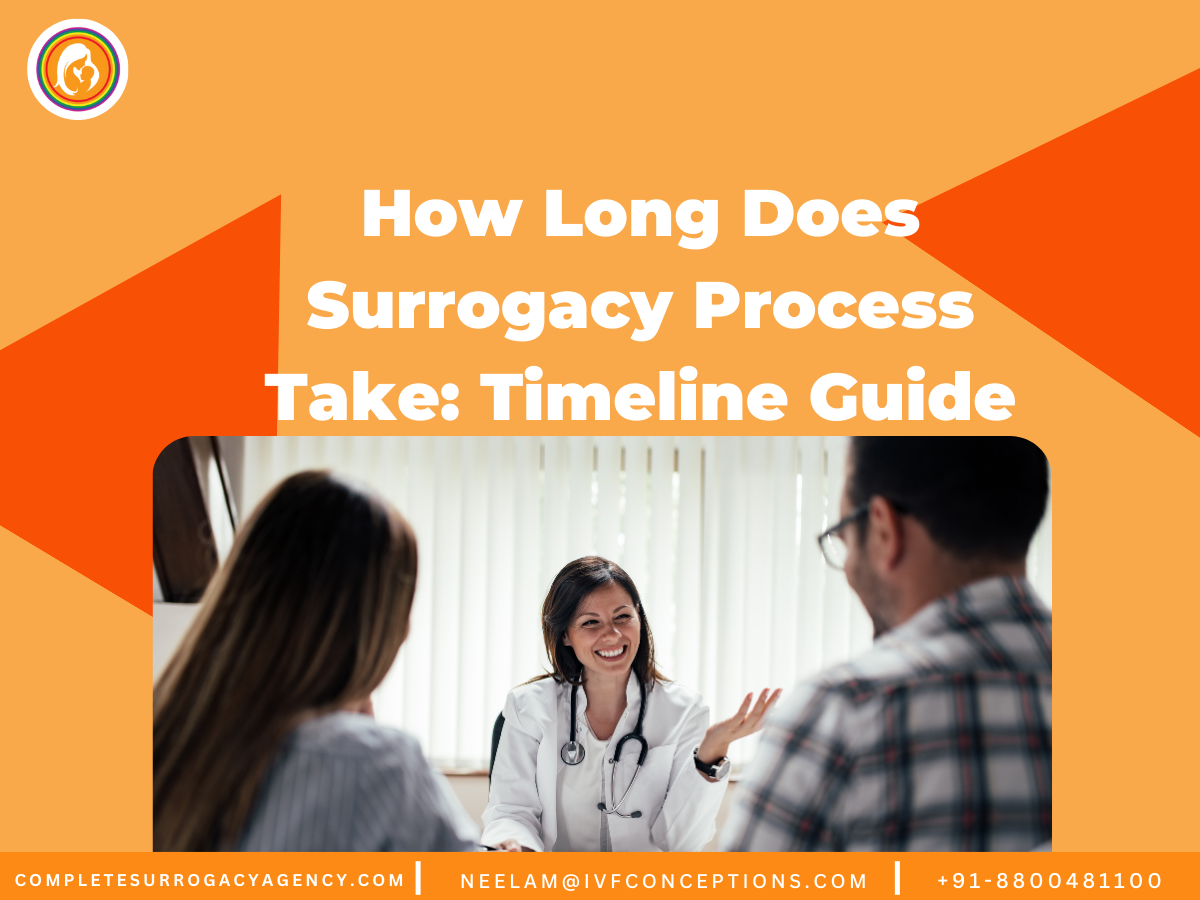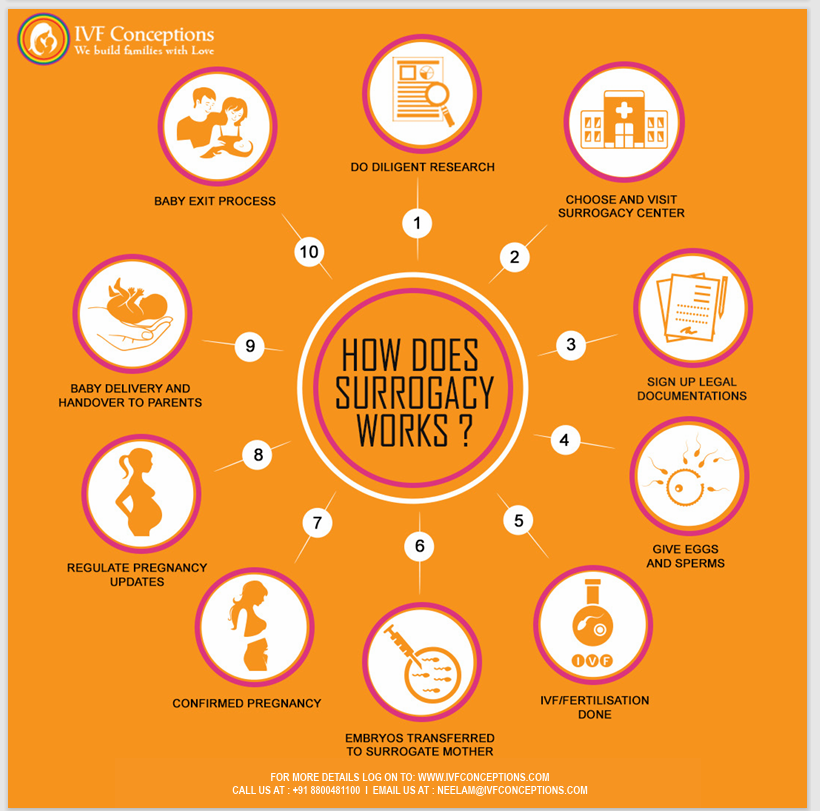How Long Does Surrogacy Process Take: Timeline Guide.

How Long Does Surrogacy Process Take: Timeline Guide.
The surrogacy process typically takes 18 to 24 months, depending on individual circumstances. Starting a surrogacy journey is both exciting and complex for intended parents. But, how long does surrogacy process take? Understanding the surrogacy timeline helps manage expectations and allows for better planning.
Several factors influence the duration of surrogacy, including matching with a surrogate, medical evaluations, IVF procedures, legal processes, and pregnancy duration.
- Book an online appointment: Get a free online consultation.
- Call\W:+91-8800481100 Email:neelam@ivfconceptions.com
For those considering gestational surrogacy, knowing the step-by-step timeline ensures a smooth and stress-free journey toward parenthood.
If you’re planning for surrogacy in 2025, it’s essential to work with trusted surrogacy agencies and professionals to navigate the process efficiently.
Key Takeaways
- The surrogacy process generally takes 18 to 24 months to complete, from initial application to the birth of the baby.
- The timeline can vary due to individual circumstances, with 15 to 18 months serving as a general guideline.
- The process involves multiple stages, including research, agency selection, legal and medical preparations, the pregnancy, and finalizing parental rights.
- Factors such as the criteria for the gestational carrier, availability of embryos, and success of embryo transfer can impact the overall duration.
- Understanding the typical surrogacy timeline can help intended parents manage their expectations and plan accordingly.
More Resources to Read:
Surrogacy Guide for Surrogate Mothers
Surrogacy Guide for Intended Parents
How does the surrogacy process work
Understanding the Surrogacy Process Timeline

The surrogacy process is a complex journey with several key stages. Each stage has its own timeline. The overall time it takes can change based on many factors. These include the intended parents’ criteria, the embryos’ availability, and the success of the embryo transfer.
Outlines the surrogacy process timeline for intended parents:
| Stage | Description of Stage | Duration |
|---|---|---|
| Research Phase | Explore family building options and decide on surrogacy. | Personal timeframe |
| Consultation and Application | Choose a surrogacy agency, sign agreement, and start embryo creation (if needed). | 1-3 Months |
| Matching | Agency finds and presents potential gestational carriers. Meet and decide on a match. | 3-6 Months |
| Medical Screening and Contracts | Carrier undergoes medical and psychological screening. Sign surrogacy contract. | 1-2 Months |
| Embryo Transfer | Prepare for embryo transfer. Success may take multiple attempts. | 1-1.5 Months |
| Pregnancy | Gestational carrier’s pregnancy, approximately 40 weeks. | 9-10 Months |
| Birth and Postpartum | Baby’s birth, establish parental rights, and postpartum period. | 1.5-3 Months |
Please keep in mind that the durations mentioned in the table are approximate and can vary depending on individual circumstances and other factors. Always consult with a reputable surrogacy agency or professional to get personalized guidance throughout the surrogacy journey.
Factors Affecting the Duration
Several factors can affect the surrogacy timeline:
- The time it takes to find a suitable gestational carrier that meets the intended parents’ preferences
- The availability and quality of the embryos for the embryo transfer
- The success rate of the embryo transfer procedure
- The legal and medical screening processes required for all parties involved
- The time needed to negotiate and finalize the surrogacy contract
Breaking Down the Stages
The surrogacy process has several key stages, each with its own timeline:
- Application and initial screening: 1-3 weeks to complete the surrogate application process
- Gathering information and medical records: 3-6 weeks to gather medical records and background documents
- Matching: 2-4 weeks to match with intended parents, with a possible rematch within 2-3 weeks if needed
- Records review, clinic screening, and legal contracts: 6-8 weeks for background checks, medical records review, and legal contract finalization
- Cycle schedule and medications: about 4 weeks from signing contracts to embryo transfer
- Embryo transfer and early pregnancy: embryo transfer typically takes place 4-5 weeks after starting medications
- Pregnancy: the surrogate will carry the pregnancy for 9 months
- Delivery day and postpartum: emotional handover to intended parents, with postpartum support from the agency
The overall timeline for the surrogacy process is estimated to be around 14-22 months from the initial application to the birth of the child.
“The surrogacy journey involves close communication between the intended parents, the surrogate, and medical professionals throughout the pregnancy.”
Initial Steps: Research, Agency Selection, and Matching
Choosing surrogacy is a big step, and getting ready can take 1-2 months. You’ll look into family building options, deal with feelings, and pick if you want a surrogacy agency. After picking an agency, finding the right carrier can take 1-4 months. The agency looks for a carrier that fits the intended parents‘ needs.
Applying to be a surrogate starts with sending 6-10 photos by email. The surrogacy admissions interview is 30-60 minutes long. Creating a legal contract with the parents and lawyers takes about 2-3 weeks.
It’s important to work with a surrogacy agency that has a good track record. A licensed agency ensures they follow the rules and are trustworthy. They check surrogates thoroughly with questionnaires, interviews, and looking at medical records.
Specialists in surrogacy make profiles for both surrogates and intended parents. They match people based on things like race, religion, age, and sexual orientation. After matching, they create legal contracts to make the match official.
Having legal help is key to getting parental rights. Some agencies always succeed in this. It’s important for agencies to be open about costs and fees during the surrogacy journey. Working with good fertility clinics is also important for surrogacy agencies.
The whole surrogacy process can take 9 months to over two years, averaging 15 to 18 months from signing up to bringing the baby home. The process includes choosing a surrogate, medical and legal checks, embryo transfer, pregnancy, and birth. If there are problems, it can take longer.
Legal and Medical Preparations
Once the match between the intended parents and the gestational carrier is solidified, the surrogacy journey enters a critical phase. This phase is key to ensuring a smooth and secure process for everyone.

- Screening and Contracts
The first step is screening the gestational carrier. This process takes about 2-4 weeks and includes a detailed medical and psychological check-up. The carrier must meet certain requirements set by groups like the American Society for Reproductive Medicine (ASRM). These ensure they are physically and mentally fit for the surrogacy journey.
At the same time, the intended parents and the gestational carrier work with lawyers to create a surrogacy contract. This contract covers rights, responsibilities, and expectations. It includes things like compensation, medical procedures, and post-birth plans. It takes about 4 weeks to finalize, as both sides need to review and agree on it.
- IVF Cycle and Embryo Transfer
After the legal contracts are ready, the focus shifts to preparing for the IVF cycle and embryo transfer. The carrier gets a special medication plan from the IVF clinic. This can take 1-2 months to complete. The goal is to align the carrier’s cycle with the embryo transfer.
The embryo transfer happens about 30 days after the carrier starts their medication. In this procedure, one or two embryos are placed in the carrier’s uterus. After the transfer, the carrier must rest in bed for 48 hours. A pregnancy test is done 1-2 weeks later to check for a successful implantation.
If the pregnancy is confirmed, the carrier will keep taking hormones and medications. Prenatal care and monitoring are crucial to ensure the pregnancy stays stable. This whole preparation stage can take 2-4 months, preparing the surrogacy journey for a smooth start.
How Long Does Surrogacy Process Take: The Pregnancy Journey
The surrogacy journey is detailed, and the pregnancy stage is the longest, lasting about 9 months. During this time, the gestational carrier is watched closely by her OBSTETRICIAN. They make sure the carrier and the baby are healthy.
| Stage | Duration | Details |
|---|---|---|
| Pregnancy | ~9 months | – Gestational carrier closely monitored by OBSTETRICIAN – Focus on health of carrier and baby |
| Pre-birth Order Process | Starts 16th-20th week | – Timing depends on carrier’s state laws – Helps intended parents gain legal recognition as child’s parents |
| Preparation for Baby | During pregnancy | – Intended parents can: • Make a birth plan • Book travel • Choose a pediatrician |
| Overall Surrogacy Process | 6 months – 2 years | Factors affecting timeline: – Speed of finding surrogates – Need for egg donation – Legal reviews – Treatment success |
Key Points:
- Pregnancy is the longest and most crucial stage
- Time for legal process varies widely
- Knowing the stages helps in planning and setting realistic expectations
- Working with surrogacy agency and legal team aids in a smooth journey
By the 16th to 20th week of pregnancy, the intended parents can start the pre-birth order process. This depends on the laws in the carrier’s state. This step helps the intended parents become legally recognized as the child’s parents when the baby is born.
While the carrier is pregnant, the intended parents can get ready for the baby’s arrival. They might make a birth plan, book travel, and pick a pediatrician for the newborn.
“The pregnancy journey is the longest and most crucial stage of the surrogacy process. It’s a time of careful monitoring, legal preparations, and excited anticipation for the intended parents.”
The time it takes for the surrogacy legal process, including pregnancy, can vary a lot. It can be as short as 6 months or as long as 2 years. Things like how fast surrogates are found, if egg donation is needed, legal reviews, and treatment success can change the timeline.
Going through surrogacy can be complex and emotional. Knowing the different stages and their timelines helps intended parents plan and set realistic expectations. By staying informed and working with their surrogacy agency and legal team, they can have a smooth and successful journey to becoming parents.
More Resources to Read:
Infertility Treatment and Surrogacy Process
9 Factors To Improve IVF Pregnancy Rate
International Surrogacy Options Worldwide
Surrogacy Guide for Surrogate Mothers
Conclusion
The surrogacy process is a complex and deeply personal journey. It usually takes 18 to 24 months to finish. The surrogacy matching process time and surrogate embryo transfer duration can change based on different factors. Knowing the stages and their timelines helps intended parents set realistic expectations and plan better.
Working with a trusted surrogacy agency helps intended parents through the surrogacy journey. This journey includes careful screening, legal steps, and medical procedures. These steps add to the overall time needed. But, with patience, persistence, and the help of experts, the dream of having a family through surrogacy can come true.
The surrogacy process is special and changes everyone involved. Knowing about the different stages and how long they take helps intended parents. They can make better choices and get ready for the challenges and happiness that come with their surrogacy journey.
If you’d like to learn more about IVF, Egg Donation, or surrogacy services globally, check out the rest of our website at Complete Surrogacy. We offer legally secure and affordable surrogacy consulting services for FREE.
Get in touch for FREE SURROGACY CONSULTING:
Mobile: +91-8800481100 ( WhatsApp, Line, Viber)
Email: neelam@ivfconceptions.com

FAQ for how long does surrogacy process takes
How long does the surrogacy process typically take?
The surrogacy process usually takes 18 to 24 months. This includes everything from the first research to getting parental rights.
What factors can affect the duration of the surrogacy process?
Several things can change how long surrogacy takes. These include what the intended parents want, embryo availability, and the success of the embryo transfer.
What are the key stages of the surrogacy process and their timelines?
Surrogacy has several important stages. These include researching and picking an agency, legal and medical prep, pregnancy, and finalizing rights.
These stages can take from 1-6 months to complete. Legal and medical prep takes 2-4 months. Pregnancy lasts 9 months. Finalizing rights takes some time too.
How long does the initial research and agency selection process take?
Choosing a surrogacy agency takes about 1-2 months. Intended parents look into their options and decide on an agency during this time.
How long does the matching process with a gestational carrier take?
Matching with a carrier can take 1-4 months. Agencies work to find the best carrier that meets the parents’ needs.
How long do the legal and medical preparations take?
Legal and medical prep takes 2-4 months. This includes screenings, contract talks, and the IVF cycle.
How long does the surrogacy pregnancy journey last?
Pregnancy in surrogacy lasts 9 months. It starts from the embryo transfer to the baby’s birth.
Source Links
- How Long Does the Surrogacy Process Take?
- The Surrogacy Process: A Timeline
- Intended Parent Timeline: How Long Does The Process Take?
- Surrogate Timeline: How Long is the Surrogacy Process for Surrogates?
- Understanding the Surrogacy Process

Author Bio: Neelam Chhagani is an International Surrogacy Expert with 15 years of experience in the fertility and surrogacy domain. As the founder of IVF Conceptions and Complete Surrogacy, she has guided over 4,000 intended parents worldwide on their surrogacy journey to parenthood. Recognized as a trusted authority, she specializes in holistic infertility solutions and third-party reproduction consulting.
Holding an MA in Counselling Psychology and a PGD in Mental Health, Neelam is a proud member of the European Fertility Society (EFS) and the European Society of Human Reproduction and Embryology (ESHRE). She is also a leading surrogacy blogger, providing valuable insights into ethical and practical surrogacy solutions.
Since 2010, committed to supporting ALL family types, Neelam has been passionate about helping intended parents grow their families with compassion, integrity, and a focus on secure and affordable surrogacy options Globally.
Learn more about Neelam:
https://www.ivfconceptions.com/neelam-chhagani-surrogacy-consultant/
https://www.linkedin.com/in/neelam-chhagani-92892229/















I was introduced to Neelam by a friend who worked with Neelam for surrogacy. Neelam is absolutely wonderful. I am a single male and the journey to fatherhood is not that easy. Neelam connected me to a program ideal for my circumstances. She was with me throughout the pregnancy providing advice and guidance along the way. I am so grateful I found her and am thrilled today that I have a beautiful daughter. I highly recommend Neelam to anyone who is on a journey to become a parent. Having a child has changed my world for the better. I wish others success with their own journey and recommend you connect with Neelam to find a path that is best for you.
SA (USA)